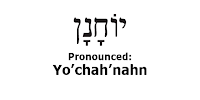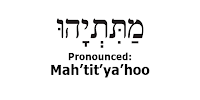The Hebrew Name Leah
(Are you looking for our Twebrew School Treats about the Hebrew alphabet or our Hebrew Instructional videos? Click here for a directory!) Click here to hear Lay'ah pronounced
Click here to hear Lay'ah pronounced
On the morning after Jacob was to marry Rachel, he woke up only to find that his new bride was the wrong woman--actually Rachel’s older sister, Leah. “‘Deceiver, daughter of a deceiver!’ he said to Leah...She said to him, ‘Is there a teacher without disciples? Did your father not address you as Esau, and did you not respond?’” (Genesis Rabbah 70:19). (Click here for Rabbi Buchwald's insights into Jacob's deception.)
Leah was a woman of great strength who was singularly focused on achieving what she knew in her heart to be her destiny. Like the other Matriarchs, Leah is credited with being both modest and beautiful. And while it is noted in Genesis (29:17) that she had “weak” eyes, the Midrash explains that this was a condition brought on by her tears. Leah’s father Laban, and his sister Rebecca, had agreed that Rebecca’s sons should marry Laban’s daughters (cousins frequently married in those days). Leah was destined for Esau, but Esau’s reputation preceded him: “She [Leah] sat at the crossroads and inquired, ‘What are the deeds of the older [son, Esau]?’ They replied, ‘He is a wicked man who robs people.’ She wept until her eyelashes fell out” (Baba Batra 123a).
Leah’s hopes were fulfilled, and she was married to Jacob. And nearly every mention of her in the book of Genesis reveals her desperate longing to feel loved. The names of the six sons whom she bore to Jacob (Reuben, Simeon, Levi, Judah, Issachar and Zebulon), each reflect her desire to strengthen her relationship with her husband.
Unfortunately, Leah never seems to win the full affections of her husband Jacob. Finally, after the birth of her sixth son, she appears to accept her imperfect situation. Pregnant for a seventh time, the Midrash explains that she prayed for a daughter, so as not to cause her sister Rachel further anguish. In one way, Leah did “win,” in that she, not Rachel, is buried next to Jacob in the Cave of the Patriarchs in Hebron.
Copyright © 2011 National Jewish Outreach Program. All rights reserved.
 Click here to hear Lay'ah pronounced
Click here to hear Lay'ah pronounced On the morning after Jacob was to marry Rachel, he woke up only to find that his new bride was the wrong woman--actually Rachel’s older sister, Leah. “‘Deceiver, daughter of a deceiver!’ he said to Leah...She said to him, ‘Is there a teacher without disciples? Did your father not address you as Esau, and did you not respond?’” (Genesis Rabbah 70:19). (Click here for Rabbi Buchwald's insights into Jacob's deception.)
Leah was a woman of great strength who was singularly focused on achieving what she knew in her heart to be her destiny. Like the other Matriarchs, Leah is credited with being both modest and beautiful. And while it is noted in Genesis (29:17) that she had “weak” eyes, the Midrash explains that this was a condition brought on by her tears. Leah’s father Laban, and his sister Rebecca, had agreed that Rebecca’s sons should marry Laban’s daughters (cousins frequently married in those days). Leah was destined for Esau, but Esau’s reputation preceded him: “She [Leah] sat at the crossroads and inquired, ‘What are the deeds of the older [son, Esau]?’ They replied, ‘He is a wicked man who robs people.’ She wept until her eyelashes fell out” (Baba Batra 123a).
Leah’s hopes were fulfilled, and she was married to Jacob. And nearly every mention of her in the book of Genesis reveals her desperate longing to feel loved. The names of the six sons whom she bore to Jacob (Reuben, Simeon, Levi, Judah, Issachar and Zebulon), each reflect her desire to strengthen her relationship with her husband.
Unfortunately, Leah never seems to win the full affections of her husband Jacob. Finally, after the birth of her sixth son, she appears to accept her imperfect situation. Pregnant for a seventh time, the Midrash explains that she prayed for a daughter, so as not to cause her sister Rachel further anguish. In one way, Leah did “win,” in that she, not Rachel, is buried next to Jacob in the Cave of the Patriarchs in Hebron.
Copyright © 2011 National Jewish Outreach Program. All rights reserved.


Comments
Post a Comment